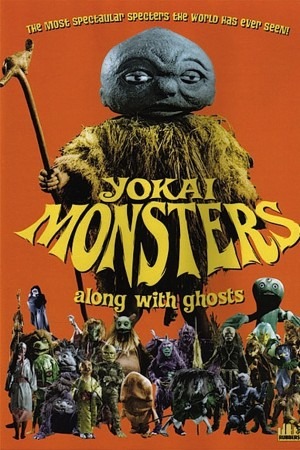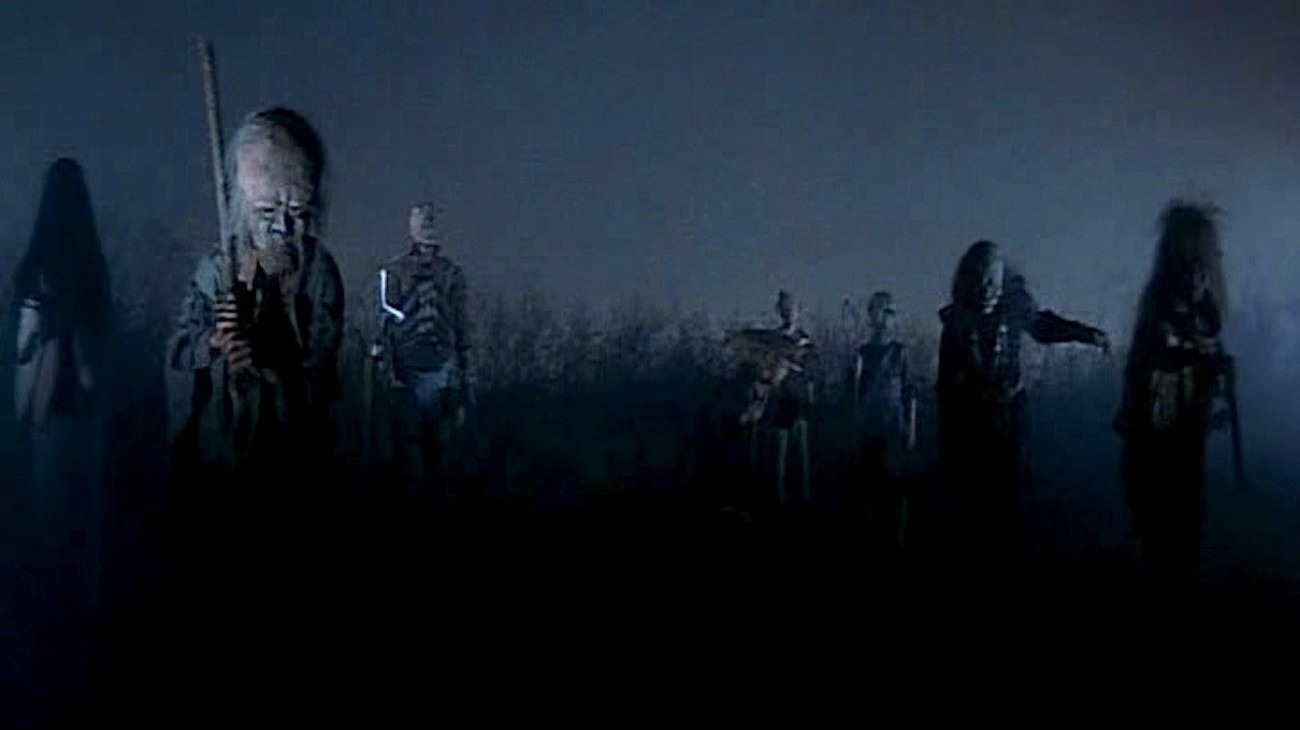
Yokai walk with me
Daiei Film's third and final film centered around yokai, 1969's Along with Ghosts (a very unlovely title, but the literal translation isn't much better), is certainly the weakest of the three. And the least centered around yokai. In fact, while 100 Monsters would be hollowed out to almost nothing without having the paranormal entities covered by the highly nonspecific umbrella of the word yokai, and Spook Warfare wouldn't exist at all, it would be fairly easy to rewrite Along with Ghosts to lack any specific kind of haunting at all; just a sense of creepy dread in an old forest in one scene, and the monster mash in the final 10 minutes of the film could be snipped out entirely, offering as it does very little other than the sense that the filmmakers forgot that they were making a yokai film until it was to late to do anything but arbitrarily throw ghosts at the finale.
None of which means that Along with Ghosts doesn't have its strengths, nor that it isn't effectively creepy - which it is, perhaps surprisingly, given how little actual creepy material exists, and how much ghastly-ass comic relief does. This is not a movie as overtly For Children as Spook Warfare, but it has a lengthy scene dropped right into the middle that finds two bumbling henchmen hunting for kids in a slapstick sequence that would barely pass muster in a Hanna-Barbera cartoon, hard to defend on any level other than "you know... for kids!", and an angry dwarf lady who is hard to defend on any level whatsoever. In the lowest depths of these passages -which I take to be unquestionably the bit where the henchmen are chasing a barrel zipping back and forth, thinking it has the children when in fact it is a dog - it's difficult to conceive of Along with Ghosts being any damn good on any level. And then the rest of the movie happens, and while it's not great by any means, it's still a pretty good ghost story even when the ghosts are conspicuously absent.
The feudal politics in this one get dense to the point that the film can be hard to follow, so what follows is more the impression of the plot than the actual plot: a yakuza band led by Kanzo (Tamaki Kazue, I think; the credits are incomplete in English, and information online is dubious) has stolen an incriminating document, killing the messengers carrying it in the middle of a sacred spot. When they are warned against this by the old man caring for that shrine (Hidari Bokuzen), Kanzo kills him too, though he survives long enough to pass word to his 7-year-old granddaughter Miyo (Burukido Masami) that she must take the document and flee to an inn some way down the Tokaido, the great sea road. She is assisted in this quest by Shinta (Hozumi Pepe), a slightly older and much more world-wise boy, and Hyakasuro (Hongo Kojiro), a samurai who had till lately been in the employ of the man Kanzo killed. Also ghosts - spooky, zombie-like ghosts who are pissed as all get-out at Kanzo and his men's initial and persistent violations of their sacred spaces, and do their own little bit to stop the yakuza, though it is very little indeed.
I'm inclined to a certain feeling of generosity towards Along with Ghosts that it probably doesn't earn. The thing is, for all its many lapses, it gets one key thing right: it paces out its most explicitly haunted scenes with great canniness, so even though there is virtually no yokai action and only a little bit more paranormal activity of any sort, there's never a long enough break that it feels like we've abandoned the universe of a lightly creepy bedtime story, where the promise of ghosts and monsters hiding just around the next bend is omnipresent, regardless of whether they actually prove to show up or not. And in fact, arguably the two best scenes in the film - the initial attack at the shrine, and Kanzo's torment of Miyo in a fixed dice game - are both eerie and ghostly without actually having ghosts. That's a tone that suits the film comfortably, and directors Yasuda Kimiyoshi and Kuroda Yoshiyuki (individually, the directors of the two preceding yokai films) did well to sustain it more or less, even though there's a pretty rough patch towards the center where too much daylight and too much kiddie frolicking and too many cartoon bad guys threaten to knock the entire film off the rails.
The flipside is that, while the tone is mostly enjoyably insinuating in its storytelling atmosphere, it leaves things a little abstract, and that hurts this as a yokai film even more than the lack of yokai does. When we think of the first two movies, we think, like as not, in terms of the great creatures: the karakasa, umbrella ghost, and the snake-necked lady, and the kappa, and that rock-headed thing from Spook Warfare who led the yokai, and my Japanese mythology is nowhere near strong enough to guess what he was supposed to be. All of them have interesting screen presence and well-defined personalities as morally neutral monsters. The phantoms in Along with Ghosts, in contrast, are totally generic and impersonal. They make an impact, I suppose, with the slow way they fade in, and the overtly threatening nature of their appearances, staged in ritualistic ways that feel far more deliberate and angry than anything in the previous movies. But they're just ugly creatures with decaying faces, and absolutely no energy. It's terribly disappointing, mostly only in reference to the first two. Though even if we just take this as a film unto itself, the relatively anonymous character of the yokai here only underscores the impression that this could just as easily have none of them, making it through on its implicit paranormal elements and leaving the outright haunting out of it.
And that would leave us with a satisfactory but not at all special samuarai adventure with a perfectly charming little girl for a protagonist, suitably threatening villains for a movie that keeps just pulling back from committing to being a kids' film, too many scenes that make their point three or four times before wrapping up, and lots of subdued, atmospheric imagery. It's a pleasing yarn, but certainly no more, and it's easily the least memorable film of the trilogy. There's a genuine sleepy pleasure to it, though, and if it's a fairly empty conclusion to a likable little horror series, I can't honestly declare it to be an obviously insufficient one.
Reviews in this series
100 Monsters (Yasuda, 1968)
Spook Warfare (Kuroda, 1968)
Along with Ghosts (Yasuda & Kuroda, 1969)






